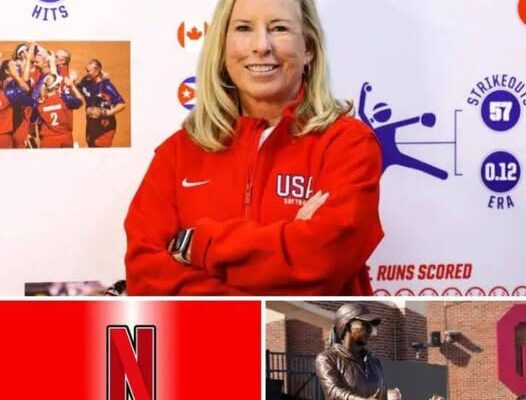Los Angeles Premiere: Netflix Debuts “Voice of College Softball,” a Compelling New Documentary Honoring the Legendary Coaching Journey of Patty Gasso.
The premiere of Netflix’s newest sports documentary, “Voice of College Softball,” brought together fans, former players, and members of the media in Los Angeles for a heartfelt and powerful celebration of one of the sport’s most influential figures—Oklahoma head coach Patty Gasso. As the lights dimmed and the screen lit up, what unfolded over the course of the film was not just the story of a successful coach, but the evolution of a woman who changed the trajectory of an entire sport through resilience, faith, and an unrelenting dedication to her players and program.
“Voice of College Softball” is more than just a biographical look at Gasso’s storied career. It is a sweeping narrative of college softball’s growth from a relatively niche sport into a nationally televised spectacle, with Gasso’s Oklahoma Sooners often serving as the driving force. The documentary traces Gasso’s journey from humble beginnings in California, through her arrival in Norman, Oklahoma in the mid-1990s, and all the way to her most recent national championship wins that cemented her legacy as one of the greatest coaches in college sports history.
As the film opens, we are introduced to a young Gasso, balancing a part-time coaching role with raising a family and teaching high school. Those early moments of struggle become a consistent theme throughout the documentary—Gasso as the underdog, as the overcomer, as the architect of a dynasty. Former players speak to her demanding standards, but also to her unwavering belief in them as women and athletes. Several of them, now coaches themselves, credit Gasso not just for their success on the field, but for teaching them how to lead.
What separates “Voice of College Softball” from other sports documentaries is its focus on Gasso’s human qualities. The film doesn’t shy away from the emotional challenges she faced. One particularly poignant segment covers a period in the early 2000s when she considered stepping away from the sport altogether. Burned out and overwhelmed, she turned to her faith for guidance. That spiritual turning point, according to Gasso and those around her, reshaped her entire coaching philosophy. No longer just about winning games, it became about building lives, cultivating leadership, and instilling purpose.
Viewers see that transformation reflected in the culture she built at Oklahoma. Interviews with players from various eras of her tenure paint a vivid picture of a program where excellence was expected, but not at the expense of integrity or personal growth. For all the trophies and accolades, what clearly mattered most to Gasso was the journey—helping young women find their voice and use the sport as a launching pad for their future. She coached with conviction, and her players bought in. The results speak for themselves: multiple national titles, dozens of All-Americans, and a team that redefined what dominance looked like in college softball.
Throughout the film, softball legends like Lisa Fernandez, Cat Osterman, and Jennie Finch offer insights into Gasso’s impact beyond Oklahoma. They speak of her as a trailblazer who helped elevate the visibility of the sport nationally. Broadcasters recall how Gasso’s passion and precision made her a media favorite during the Women’s College World Series broadcasts. Her ability to communicate the nuances of the game helped bring in new fans and inspired young girls across the country to pick up a glove and dream big.
The Los Angeles premiere itself was a reflection of Gasso’s stature in the game. Red carpet arrivals included many of her former players, now stars in their own right, as well as prominent figures from the sports world. The crowd buzzed with anticipation, but there was also a deep sense of reverence. As the film played, moments of laughter and quiet tears filled the theater, particularly during the sequences that highlighted the personal sacrifices Gasso made for the sake of her team. One former player broke down when discussing how Gasso supported her during a family crisis. “She wasn’t just my coach,” the player said. “She was my anchor.”
Also prominent in the documentary is the role of family. Gasso’s husband, Jim, and their sons are featured throughout, providing a behind-the-scenes look at how the family navigated the intense demands of coaching at the highest level. Her sons, both of whom have pursued careers in coaching and athletics, speak candidly about the example their mother set—not just through her wins, but through her work ethic, humility, and unwavering faith. That personal foundation, according to them, became the blueprint for the professional success that followed.
Netflix’s production team worked closely with the University of Oklahoma and Gasso’s family to ensure the documentary was both accurate and emotionally honest. Archival footage—some of it never seen before—offers viewers an intimate look at pivotal moments in Gasso’s career. From fiery pregame speeches to quiet postgame reflections, the film captures the full spectrum of what it means to lead a team at the highest level. It also juxtaposes Gasso’s journey with the broader growth of women’s sports, drawing clear parallels between her success and the rise in national attention given to women’s collegiate athletics.
In one especially stirring sequence, the film shows Gasso walking through a nearly empty Hall of Fame Stadium the night before a championship game. Her voiceover reflects on the improbable nature of her journey—from coaching junior college players on dusty fields in California to preparing for yet another title game under the lights in Oklahoma City. “I never set out to be great,” she says in the film. “I just wanted to do right by the game, and by the young women who trusted me to lead them.”
That humility resonates throughout “Voice of College Softball,” giving the film its emotional backbone. Gasso’s coaching tree—now spread across the country—is portrayed not just as a mark of her influence, but as a testament to the culture she cultivated. The documentary ends with a sequence showing former players who are now coaching their own teams, passing down the lessons they learned under Gasso. It’s a full-circle moment that leaves viewers with a deep appreciation for her generational impact.
The critical response following the premiere has been overwhelmingly positive. Reviewers have praised the film’s emotional depth, its sweeping historical perspective, and its spotlight on a sport and a coach too often overlooked in the mainstream. Sports journalists in attendance noted how rare it is for a documentary to combine such elite athletic success with an exploration of spiritual and emotional leadership. Many walked away feeling not just inspired, but changed.
For those who have followed Gasso’s career, the documentary is a long-overdue tribute. For newcomers, it’s a gripping introduction to one of the most respected figures in collegiate sports. But no matter the audience’s familiarity with softball, one thing becomes clear by the film’s conclusion: Patty Gasso is more than a coach. She is a mentor, a pioneer, a mother figure, and the voice of a movement that has brought dignity, power, and visibility to women’s athletics.
As the credits rolled at the premiere, the theater erupted in applause—not just for the film, but for the woman at its center. Gasso took the stage briefly afterward, thanking the audience and the filmmakers. In her trademark understated style, she deflected the attention back to her players, past and present. “This isn’t just my story,” she said. “It’s theirs too. And it’s softball’s story. I’m just grateful I got to be a part of it.”
That humility, paired with an unmatched competitive drive, is exactly what made her worthy of such a tribute in the first place. “Voice of College Softball” does more than chronicle wins and championships—it captures the heart of a woman who gave her life to a game and, in doing so, changed it forever. For anyone who loves sports, storytelling, or the quiet power of perseverance, this documentary is not to be missed.



